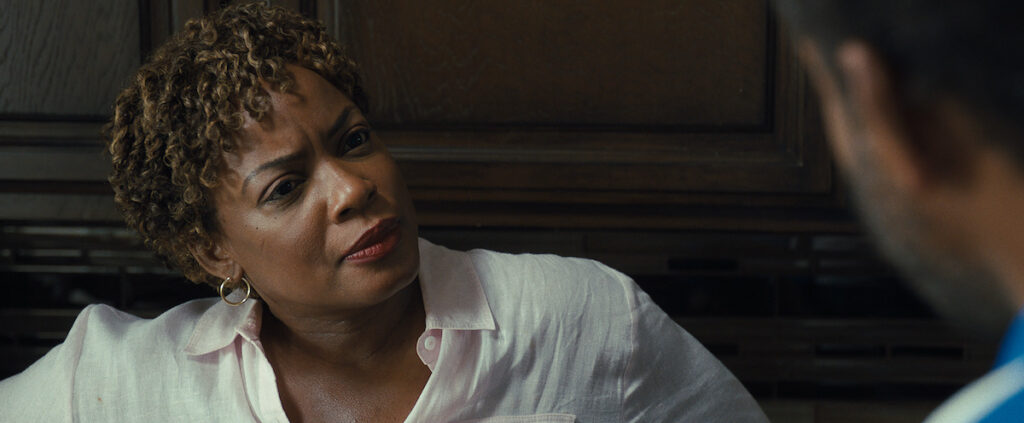The title is “King Richard,” but the film Venus and Serena Williams produced about their childhood makes it clear that their mother, Oracene (“Brandy”) Price, was equally important in providing the foundation, support, and inspiration that led them to become tennis legends. Aunjanue Ellis gives an extraordinary performance as Ms. Price, showing us her strength, her faith, and her vulnerability. In an interview, she talked about using her performance to help convey the difference between the two eras depicted in the film, why it is important to focus on the character as written even if the character is a real person, and being inspired by her own family in every role she takes.
The film takes place in two distinct time periods, when the girls are young and the family is living in Compton and then when the girls are in their early teens being coached in Florida. We see very clearly that the relationship of Richard and Oracene is very different in the later scenes. How do you as an actress approach a role with that kind of challenge?
Oracene was a co-conspirator in this crazy dream that they had. It really is when you hear about it, it is utterly irrational that they would have children and make them tennis stars. And for that to happen she had to birth these tennis stars. It wasn’t like they adopted some really fabulous tennis players. She had to birth them. I think that was a real excitement about that. And she was their coach just as much as he was. Physically, she was more their coach than he was. He was more of a guide, I would say. But she trained herself so she could teach those girls. They would all be on the tennis court at the same time. And I just think that in the first scenes there was that moment of just the world hadn’t entered it. The world hadn’t entered the dream yet. And so that naiveté was still there. That wide-eyed view of what they could make happen was still there.
And then when it became more real when the world invaded this, and then when the world had designs on their children, she saw a change in her husband and knew that she had to protect her girls from the tennis industry, from a world that had no interest in little black girls. They marginalize them, they erase them in the tennis industry that was, and still is, white. So she had to protect her girls from the sport of tennis, and protect her girls from the vaseline notions of her husband. So what you see is the progression of that.
How do you work with young actors to create an authentic sense of family and history?
These young girls happen to be really, really special young women. So that makes it really, really easy. When you’re working with someone, it doesn’t matter how old they are. If they are closed off, if they’re fearful, it’s hard to connect. It’s hard to present any sort of living experience on camera with them.
That’s not a matter of age. Older actors struggle with that as well. But these young women are really extraordinary on and off-camera. And they’re craftswomen. It looks really easy, it looks like they’re just having a good time with Will Smith on camera. That’s what it looks like. And yes, they are having a good time with Will Smith on camera and having a good time with each other. But there’s skill to that. Acting in front of a camera is acting in front of a camera. The camera is not hidden, it is in front of your face, and you have to pretend that it’s not. So you are pretending to be someone else. And pretending that this big black machine is not watching your every move and then okay, and now be natural. That is a feat to do. All of that while this big black machine is in your face. That’s why theater is very different from acting in front of a camera. I can’t say that enough. These young women are very, very good at what they do. And so it was easy for me to have that with them. Because as I said, they’re very good at what they do. And then they’re lovely people, lovely young women.

One of the most unexpected things that I enjoyed about the movie was the sense of joy that the family has. In most films about people who have reached an extraordinary level of achievement there is a lot of family stress, but this family always seemed to be filled with joy.
We formed a little bit of a family as we worked. [Director] Reinaldo Marcus Green really just captured what was happening in front of him. When I say that, I mean, really. He would just have the camera rolling, and sometimes we wouldn’t even know that he was rolling film. And so, what you saw was just these young women being themselves. There was an openness from all of them. And not just in Saniyya and Demi, but in the other young ladies as well. All five of these young women were just extraordinary in that way.
When I say openness, it means that they wanted to see what would happen. Rei would say, “Action,” and then we just saw what we could create, what we could build with each other. And there was a great unity in that. So there was creative unity that forms. And when it’s like that, you just relax into something, you can relax into an experience. You can relax into just being in the van with some people. It’s not about portraying a scene in a van. We are Will Smith, Aunjanue Ellis, Saniyya, Demi, we are these other characters, but we can just literally enjoy the ride because we can put all that other stuff, the artificial part of it, we can put it aside and just have an experience.
The last time I talked to you was also about playing a real-life person who was a very strong mother in the Clark Sisters movie. When you play a real person, how is the preparation for that different from playing a fictional character?
I really keep in mind that even though I am playing someone who’s a real person, I’m playing a character. I never lose sight of the fact that I am playing a character. Because that’s where my work begins. My work begins in the make-believe part. If not, I’m doing a recreation for a documentary. And that’s not what I’m doing. I’m playing the character Oracene Price in the movie “King Richard.”
When I’m clear on that, everything else is the gift of being able to hear her voice. They did these epic recordings of Miss Oracene. So I got to hear her speak for herself. I didn’t have to ask anybody about her. She told her own story. And that was my raw material. That was the clay that I used. When you’re playing someone who’s not real you got to make that crap up. You got to make up that story, you got to make up all that stuff. And that’s fine, that’s cool. But when it’s real, when you can actually hear that person, it’s a gift. And so, from there all that is foundation, and then you can fly from there. But I don’t apologize, I don’t feel burdened by what I’m trying to do, acting and pretending. I don’t apologize for that, I don’t feel burdened by it. Ultimately, you want the family to feel happy and feel that they see a reflection of their family. I make my best effort to tap into truth; that’s the best that I can do. That’s what I try to do. Whether it’s a character that’s real or not real.

Ms. Price describes herself in the film as an athlete. Does that affect your physicality in portraying her?
Yes, she was an athlete. In these recordings, she talks about how she loved playing baseball as a kid. And how when she would step up to the plate to bat they would be mad because they knew she would hit the ball so far that they would have to chase it. They just hated to see her coming. That story right there informed my whole performance, because you see this woman who’s quiet in public situations. You see a quiet woman. But what’s inside that quiet woman is a volcano. It’s a volcano that has lava of an athlete and that has lava of a God-worshipping woman. It’s all of that stuff. And also what that is, is how it converts into how she deals with her daughters. She had experience.
She’s like, “Let me tell you.” Hearing her say that she didn’t have to apologize. When I listened to her, I felt like I was listening to a woman unburdening herself. And really it is that. We have this perception of Miss Oracene because we see her in the stands quiet, cheering for her daughters here and there, but we don’t know who she was. We don’t know what she did in designing the play of her daughters. We don’t know any of that. The great thing is knowing that history and knowing the genius that she brought to being the coach that she was and wanting Serena particularly to have a singular kind of play.
They insisted that I have tennis lessons! And so, I took tennis three times a week for several weeks just so I wouldn’t look completely terrible on-screen, so I looked like I had some measure of ability. But the stuff that they wanted me to try to do that she taught them, I couldn’t do that. She’s extraordinary, this woman.
What inspires you?
I find inspiration everywhere. But there are certain places that I keep returning to. I return all the time to music. I return all the time to the South, the land, the culture of the South. And I return all the time to my family. And the rich, the rich, rich, rich, rich, rich, rich, rich, rich history that my family has. I just lost my mother’s oldest brother, I can’t even say his name it hurts so bad, over the weekend. The epic story that my mother and her six brothers and sisters had. I carry that with me when I come to set. I carry them with me. So my family, music, and the South.
“King Richard” will be playing in theaters and available on HBO Max on November 19th.












